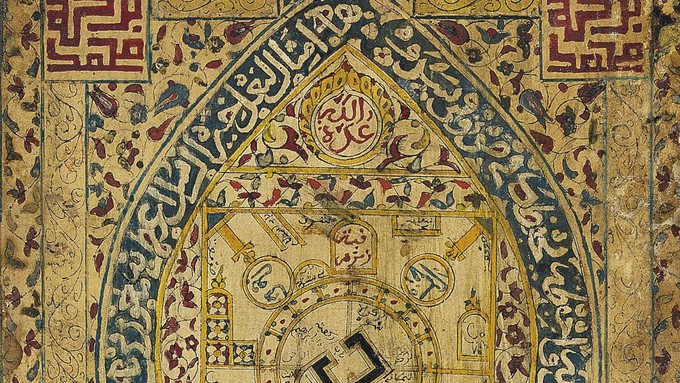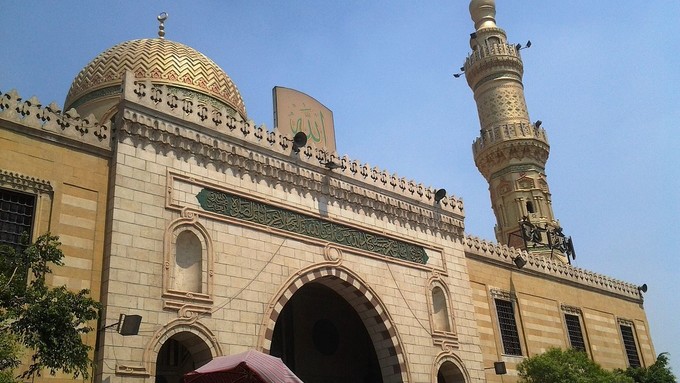Ahl al-Bayt: A Source of Resistance and Rejection of Political Quietism
During the sacred month of Muharram, Muslims are reminded of the stories of Musa (peace be upon him) leading the Children of Israel out of the tyranny of Pharaoh in Egypt and the martyrdom of Imam al-Husayn bin Ali bin Abi Talib (may Allah’s blessings be upon them). Unfortunately, these events are too frequently discussed only as historically occurrences without using them as models of contemporary spiritual-based resistance to oppression. This especially holds true to how the tragedy of Karbala is devalued or in many instances ignored by preachers in masaajid throughout North America during Muharram.
In an ImanWire podcast titled "Reclaiming the Heritage of Ahl-ul-Bayt,", Shaykh Hassan Lachheb (may Allah preserve him), who directs Tayseer Seminary in Knoxville, TN and teaches Maliki fiqh, made the point that Muslims have Imam al-Husayn as a source of inspiration and a model for principled resistance within our tradition. He further stated that Ahl al-Bayt in this regard have been neglected by the People of the Sunnah and in general have not been given their due importance.
As there is a trend among some Muslim activists to center secular-based paradigms and jargon that in many cases displays irreverence for Islamic tradition, there is also a tendency within some “traditional” circles to lean towards political quietism which has led to the alignment with oppressors in the name of political pragmatism. Moreover, even the mention of Ahl al-Bayt within these circles gets reduced to ahistorical terms or reduced in importance to ceremony, as in referencing chains of spiritual orders, litanies and aphorisms from later descendants of Sayyidah Fatimah az-Zahra (may Allah’s blessings be upon her).
Imam al-Husayn’s refusal to pledge allegiance and cooperate with the Umayyad regime of Yazid bin Mu’awiyah was based on a sacred trust which he inherited. His principles would not allow him to be seen as giving credence to a regime led by a person known by his actions to be corrupt. When leaving al-Madinah for Makkah with his family members to avoid pledging allegiance to Yazid, he wrote to his brother Muhammad bin al-Hanafiyyah (may Allah’s mercy be upon him):
With Allah’s name, the Merciful Benefactor, the Merciful Redeemer. This advisement is from al-Husayn bin Ali bin Abi Talib to my brother Muhammad al-Ma’ruf bin al-Hanafiyyah. Surely al-Husayn testifies that there is no deity except Allah who is One without any associate and that Muhammad is His slave and messenger. It comes with truth derived from whom is with the truth, that paradise and hell-fire are true and that the Hour is approaching in which there is no doubt. And that Allah will resurrect those in the graves. Surely, I am not resisting to cause mischief, for the sake of adventure, nor to cause corruption and wrongdoing. I am but resisting to seek reform of the Ummah of my grandfather, to enjoin good, forbid evil and to follow the path of my grandfather and my father Ali bin Abi Talib.1
Though it was prophesied that Imam al-Husayn would be martyred in which he had full knowledge of this reality, he was not a fatalist. He knew that he had a special duty to exhibit one of the most difficult tasks, for he understood well the saying of his grandfather that “The most virtuous struggle is speaking a word of justice to a tyrannical authority.”2 It was the struggle of Imam al-Husayn and 72 of his supporters who achieved martyrdom at Karbala that kept alive this teaching of the Prophet (prayers and peace be upon him and his family) as the teaching was losing its applied meaning within the Ummah.
After the martyrdoms of Imam al-Husayn and his supporters at Karbala, the descendants of Sayyidah Fatimah az-Zahra were the foremost of those who delivered the complete message of the Qur’an and Sunnah at the risk of their lives. Following Karbala, the next descendant of Imam al-Husayn to be martyred by the sword was Sayyid Ali bin Muhammad al-Baqir bin Ali Zayn al-Abidin (may Allah’s blessings be upon them).3 Sayyid Ali was sent by his father from al-Madinah to Persia upon the request of the people to teach and guide them in the deen. When Sayyid Ali began to develop more disciples, troops from the Umayyad army under the rule of Hisham bin Abd al-Malik killed him and his students then sent his decapitated head to Syria just as his great-grandfather’s decapitated head was taken. Following the martyrdom of Sayyid Ali was the martyrdom of his uncle Imam Zayd (may Allah’s blessings be upon him) who was known as the “Ally of the Qur’an.”4 Imam Zayd stood up to the injustices perpetrated by Hisham bin Abd al-Malik. Imam Abu Hanifah (may Allah be pleased with him), who was a student of Imam Zayd, and Sufyan ath-Thawri (may Allah have mercy upon him), a student of Imam Ja’far as-Sadiq (may Allah’s blessings be upon them) both gave verdicts to support Imam Zayd.5 Just like his grandfather and his nephew, Imam Zayd was also decapitated and had his head carried like a trophy to Syria. Once the Abbasids overtook the Umayyads, a new dynastic rule came about which replaced the previous oppressive dynasty. Imam Abu Hanifah and Imam Malik (may Allah be pleased with him) shortly after supported two uprisings led by descendants of Imam al-Hasan bin Ali (may Allah’s blessings be upon them) against Abbasid tyranny, and both of those scholars were imprisoned and tortured. Imam Shafi’i (may Allah be pleased with him), who came under the spiritual tutelage of Imam Yahya bin Abdillah bin al-Hasan bin al-Hasan bin Ali bin Abi Talib (may Allah’s blessings be upon them) and Sayyidah Nafisah bint al-Hasan bin Zayd bin al-Hasan bin Ali bin Abi Talib (may Allah’s blessings be upon them), was also arrested and put in chains. Also, Imam Ahmad bin Hanbal (may Allah’s mercy be upon him) was later imprisoned by another Abbasid ruler for having the audacity to disagree with his views.
Most of the male descendants among the first 7 generations of Imam Ali bin Abi Talib (may Allah ennoble his face) were either thrown in jail and/or martyred by the sword or by poison. Whether by teaching the unadulterated sacred law and spiritually based ethics or due to challenging unjust policies, Ahl al-Bayt embodied the merging of scholarship and principled action. Those great scholars who learned from them followed their example by not giving validity to tyrants to be used as tools for propaganda nor aided them through words that gave cover to wrongful incarceration or killing of fellow Muslims. The early members of Ahl al-Bayt are our pristine example on how to resist the darkness of oppression and not sink into quietism as relayed in the Prophetic narration, “Surely, I leave among you that which if you hold on firmly to, you will never go astray after me: the Book of Allah and the mantle of my Ahl al-Bayt.”6
May Allah (Mighty and Sublime) have us hold on firmly to the way of the Qur’an and Sunnah and the lived practice of those two through the early nobles of Ahl al-Bayt. Ameen.
1. Ibn Shahr Ashub, Manaqib Aal Abi Talib, Juz 4, Page 89
2. Abu Dawud, Sunan Abi Dawud, Hadith #4344; Ibn Majah, Sunan ibn Majah, Hadith #4011
3. Fakhr ad-Din ar-Razi, Ash-Shajarah al-Mubarakah, Page 89; Ibn al-Jawzi, Siffah as-Safwah, Page 331; Sibt bin al-Jawzi, Tadhkirah al-Khawass, Page 289; Ibn as-Sabbagh, Al-Fusul al-Muhimmah, Page 218; Ash-Shablanji; Nur al-Absrar, Page 220;
4. Yahya Al-Haruni, Al-Ifadah fi Tarikh al-A’immah as-Sadah, Page 13; Al-Asbahani, Maqatil at-Talibin, Page 127; Ash-Shablanji, Nur al-Absar, Page 300
5. Al-Asbahani, Maqatil at-Talibin, Page 141; Jamal ad-Din al-Hadi al-Haruni, Hidayah ar-Raghibin, Page 89
6. At-Timidhi, Sunan at-Tirmidhi, Hadith #3786; an-Nasa’i, Sunan al-Kubra, Hadith #8148; ibn Abi Shaybah, Musnad ibn Abi Shaybah, Hadith #13679; at-Tabarani, Mu’jam al-Awsat, Hadith #3439; bin Hanbal, Mushad al-Imam Ahmad, Hadith #11119; Abu Ya’la, Musnad Abi Ya’la, Hadith #1037; ibn Abi Asim, As-Sunnah, Hadith #753
Academic Related Articles


Taking the Prophet as Your Spiritual Guide: Celebrating and Passing into the Prophetic Reality
Indifference to the celebration of the Prophet ﷺ denies the community the opportunity to unite upon his character and spirituality, in the face of so much pressure to move away from him. What are the tried and true methods to bring the Prophet ﷺ into our daily lives?

Sayyidah Nafisah: The Saintly Lady of Egypt
Often underdiscussed among Muslim circles in the West are the righteous and scholarly women among the pious early Muslims. Out of the many other stellar women from early Islamic history worthy of mention, Sayyidah Nafisah (may Allah be pleased with her), already adored by millions of Egypt, was a shining star that should be known by all.
